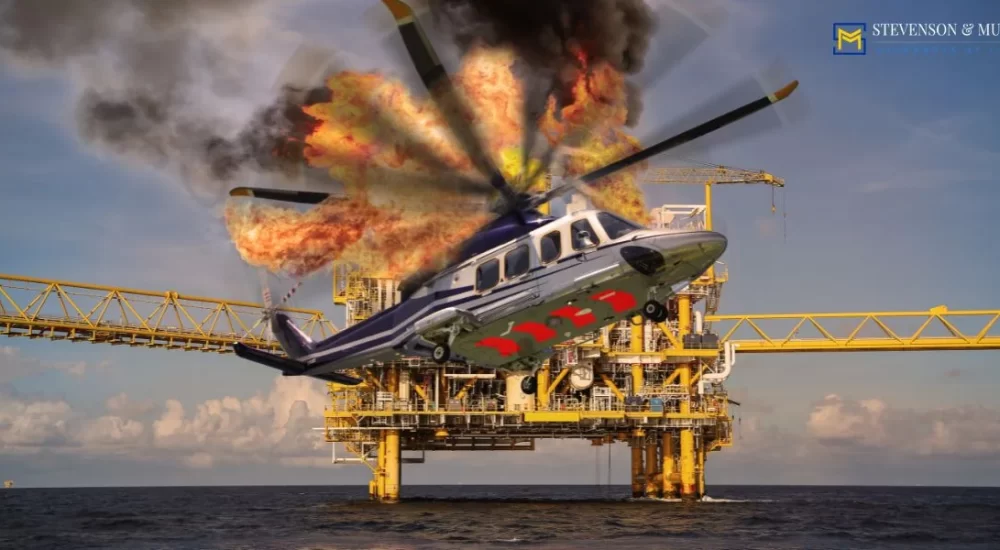How Common Are Helicopter Crashes in Texas Offshore Industries?
Offshore oil platforms are a very profitable and necessary sector of the global economy. Transport to and from those oil platforms is largely done with helicopters, as those vehicles are consistently relied on to bring workers to the platform, take them back home, bring food and equipment, and fly in emergency aid if it is needed. You may be asking, “How common are helicopter crashes in Texas offshore industries?” The use of these helicopters is unavoidable, and it can sometimes end in disaster.
How Common Are Helicopter Crashes in Texas Offshore Industries?
In a 2023 study, Western OEM (Original Equipment Manufacturer) helicopters that were largely responsible for transporting offshore oil platform workers to and from their destinations safely suffered approximately 21 accidents, which resulted in 22 fatalities over a study period of five years. In 2023 alone, there were three confirmed accidents that resulted in four fatalities.
It is an unfortunate fact of life that, in an industry that frequently uses helicopters as its sole delivery system of workers, equipment, food, and rescue aid, there are going to be accidents. Still, the frequency of helicopter accidents in the offshore oil industry is far smaller than the overall frequency of helicopter accidents in the United States alone.
Common Causes of Helicopter Accidents in the United States
Helicopter crashes are not all that common in the United States. According to one study, in 2020 alone, there were 92 helicopter accidents in the United States. Of those 92, 31 resulted in fatalities. In that same year, there were 1,085 plane crashes in the United States. Of those 1,085, 880 were nonfatal and 205 resulted in fatalities.
Even though helicopter crashes may not be all that common, they are still terrifying, especially to people who frequently travel in helicopters. Here are some of the more common causes of helicopter accidents:
Pilot Error
Approximately 33% of all helicopter crashes in the United States are the direct result of pilot error. Pilots are not perfect. They make mistakes. Unfortunately, those mistakes can result in fatal consequences if they are not careful.
Ultimately, the pilot has the most control over the aircraft, and it is their decision-making skills that everyone must rely on for the duration of the flight. If that pilot decides that flying through inclement weather instead of waiting it out is the way to go, there’s very little you can do about it. Most pilots make it to their destinations consistently, but sometimes they do not.
Mid-Air Collision
Around 18% of all helicopter crashes in the United States are the result of a mid-air collision. There are situations where a helicopter crashes into another helicopter or a plane. Due to the force, onboard fuel, and heights from which these incidents occur, they nearly always result in catastrophe. It can happen due to a miscommunication from the ground or a pilot failing to notice the oncoming aircraft.
Equipment Failure
About 25% of all helicopter crashes in the United States occur due to equipment failure of some kind. For any vehicle to function at its most effective, every piece of equipment within that vehicle must be working properly. The same is true for helicopters, though equipment failure can result in a much worse situation if the problem isn’t realized before takeoff.
FAQs
Q: How Often Do Offshore Helicopters Crash?
A: One comprehensive study showed that there were only 21 helicopter accidents between 2019 and 2023 from Western OEM helicopters that were transporting offshore oil platform workers. That’s significantly beneath the number of helicopter crashes in the U.S. in just 2020, which was around 92. A report by the CDC, however, reports that 75% of transportation crashes between 2003 and 2010 were helicopter crashes. Judging from various reports, helicopter crashes appear to be happening less frequently.
Q: What Are the Chances of Getting in a Helicopter Crash?
A: The chances of being involved in a helicopter crash are very low in the United States. As of 2020, the fatal accident rate for all helicopters in the country was approximately 0.72 per 100,000 hours of logged flight time. The odds tend to go up for people who frequently use helicopters as a primary mode of transportation, as opposed to those who rarely, if ever, find themselves riding in a helicopter.
Q: Where Do Most Helicopter Crashes Occur?
A: Helicopter accidents typically tend to occur in states and areas that have more helicopters operating for industry purposes and tourist attractions, with California and Texas leading in the number of accidents as of 2016, according to a study by the Vertical Aviation Safety Team Obviously, in places where helicopters are in frequent use, there are going to be higher chances of accidents happening. The same could be said about virtually any vehicle that is in high demand in certain places.
Q: Are Offshore Helicopters Safe?
A: The short answer is that it really depends. Sometimes, offshore helicopters are perfectly safe and make it to their destinations consistently without incident. Other times, something happens, and catastrophe ensues. It depends entirely on a variety of factors, such as:
- The skills of the pilot
- Their reaction time
- How up-to-date the equipment is
- Whether the helicopter is being properly maintained
- The current state of the weather
If you use a helicopter more frequently, the odds of you being involved in an accident are higher.
Reach Out to an Experienced Offshore Injury Lawyer Today
Being involved in a helicopter crash can be a truly traumatizing and unforgettable event. The very fact that you even survived is something to marvel at. If you do survive a helicopter accident, it is important that you take the proper steps to hold the responsible parties accountable for their actions. This can ensure that this does not happen again to anyone else.
At Stevenson & Murray, our offshore injury lawyers can help you find those responsible parties and determine the degree of any negligent behavior that may have led to the accident. Contact us to schedule a consultation and see how we can assist.

Get Help Today
Request a Free Consultation
"*" indicates required fields


